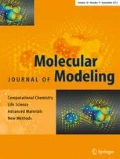Recent advances in theoretical and experimental techniques allow us to characterize and understand properties of complex molecular systems, opening new prospects for the rational design of new molecular materials such as drugs, pesticides, catalysts, selective absorbents, sensors, molecular memories, wires, etc. An overview of recent advances in this area was the subject of the international workshop “Modeling & Design of Molecular Materials”, held 16–20 September 2004 in Wrocław University of Technology, Poland. This Special Issue of the Journal of Molecular Modeling contains 21 papers selected from topics covered in 29 lectures and 40 posters presented during the meeting.
Much progress in this field has been made since our previous meeting in this series (http://physics.mff.cuni.cz/kchfo/workshop03/) with proceedings published in a Special Issue of Int. J. Mol. Sci., vol. 5 (2004) (http://www.mdpi.org/ijms/list04.htm).
Recent developments in methodology useful in the analysis of chemical bonding and reactivity were covered in contributions by Tachibana and Ordon.
Structural and other properties of molecular aggregates were discussed by Wawrzyniak et al., Wojdel et al., Goraczko, Lewanowicz et al. and Burda et al.
Kuchta et al., Duda et al., Szyja et al. and Politzer et al. report results of simulations of nanomolecular systems characterized by highly specific adsorption, whereas Sikorski and Romiszowski model diffusion through nanoporous materials.
Molecular systems with potential applications as molecular memories in molecular electronics or nonlinear optics have been studied by Bartkowiak et al., Filipek, Verma et al. and Ciarkowski et al.
Finally, polymerization processes and superconducting materials were discussed by Mitoraj et al. and Grochala, respectively.
W. Andrzej Sokalski and Jaroslav V. Burda—Guest Editors
Author information
Authors and Affiliations
Corresponding author
Additional information
An erratum to this article is available at http://dx.doi.org/10.1007/s00894-005-0283-4.
Rights and permissions
About this article
Cite this article
Sokalski, W. The international workshop “Modeling & Design of Molecular Materials”, held 16–20 September 2004 in Wrocław. J Mol Model 29 (Suppl 1), 1 (2023). https://doi.org/10.1007/s00894-005-0277-2
Published:
Issue Date:
DOI: https://doi.org/10.1007/s00894-005-0277-2

